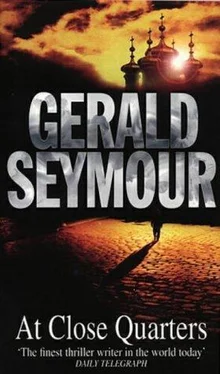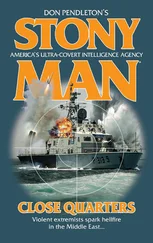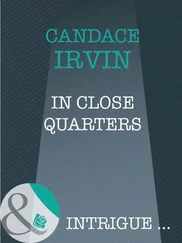Gerald Seymour - At Close Quarters
Здесь есть возможность читать онлайн «Gerald Seymour - At Close Quarters» весь текст электронной книги совершенно бесплатно (целиком полную версию без сокращений). В некоторых случаях можно слушать аудио, скачать через торрент в формате fb2 и присутствует краткое содержание. Жанр: Триллер, на английском языке. Описание произведения, (предисловие) а так же отзывы посетителей доступны на портале библиотеки ЛибКат.
- Название:At Close Quarters
- Автор:
- Жанр:
- Год:неизвестен
- ISBN:нет данных
- Рейтинг книги:3 / 5. Голосов: 1
-
Избранное:Добавить в избранное
- Отзывы:
-
Ваша оценка:
- 60
- 1
- 2
- 3
- 4
- 5
At Close Quarters: краткое содержание, описание и аннотация
Предлагаем к чтению аннотацию, описание, краткое содержание или предисловие (зависит от того, что написал сам автор книги «At Close Quarters»). Если вы не нашли необходимую информацию о книге — напишите в комментариях, мы постараемся отыскать её.
At Close Quarters — читать онлайн бесплатно полную книгу (весь текст) целиком
Ниже представлен текст книги, разбитый по страницам. Система сохранения места последней прочитанной страницы, позволяет с удобством читать онлайн бесплатно книгу «At Close Quarters», без необходимости каждый раз заново искать на чём Вы остановились. Поставьте закладку, и сможете в любой момент перейти на страницу, на которой закончили чтение.
Интервал:
Закладка:
Through the portholes of the Gazelle helicopter, Gunter saw laid out beneath him the bright and tranquil breadth of the Beqa'a valley.
They clapped, the men and the boys, and the women from behind their face scarves trilled their appreciation.
There was the drone of the working generator, there was the splash of water lifted from great depths and now free to run in the dug channels.
The merchant grinned and bowed to receive the congratulations.
The merchant was asked by the headman of Khirbet Qanafar to take food at his table, to share the midday meal. He was pleased to accept. He fancied he could smell the cooking of partridge. He was pleased to accept because it suited him to stay at the village town of Khirbet Qanafar until last light.
The merchant had heard the shooting perhaps two miles north up the valley. News came that a Jew had been captured, that a hostage prisoner had been freed.
Only one man captured… In his long years in Lebanon he was practised in deceit, he could guard his emotions.
He would be honoured to take food with the headman, and with the headman's sons.
He had done it as he thought Crane would have done it.
When the sun was behind him at last Holt crawled out of the fragile cover of the net and down the hillside.
He thought that he had been moving for a little more than an hour. Flat on his stomach, stomach ground against the earth and sun-scorched rock, he had gone the four hundred yards from the lying up position to the place where Crane had killed the cook.
The blood was there. The blood reinforced the truth.
The truth was the capture and the throwing through the hatch door of the military helicopter of Noah Crane.
He could hear the shouting and the triumph from the camp. Singing and the yelling of slogans, voices competing one with another. Then he found Crane's belt. It was wedged down between two small rocks and half buried by a trailing network of undergrowth.
Crane had left his belt on purpose. Crane's bible, do nothing without a reason.
Slowly, with great care, each movement weighed and considered, young Holt began the stomach crawl back towards the lying up position, and the heat shimmered over him, and the sun burned through the cotton of his tunic top.
As Crane himself would have done it.
19
It was two o'clock in the afternoon.
It was that part of the daytime during which the valley slept. Low on the Beqa'a, where the Litani river and the irrigation channels made the shades of green, only the butterflies moved, hovering between flowers. That part of the day when the men had slid off to their homes, and their women to the coolness of their houses, and the children had gathered under the shade-spreading trees. The soldiers in their nearby temporary barracks had taken to their sleeping cots. The shepherd boys dozed, their flocks had tucked in their legs and knelt and panted. A great sloth blanketed the valley.
At two o'clock in the afternoon Holt managed to reach his lying up position again.
He lay under the scrim net and he gasped down the warm air. He heaved to draw the strength down into his lungs. He felt the sweat running on his body. He drank water until his belly, his bladder, could take no more.
He had no shortage of water. He had the water from Crane's pack. He had no shortage of food because he had Crane's food. As he dragged the air down into his chest, as he poured the water down his throat, he could lie outstretched under the rock overhang because he had also Crane's place. He had Crane's water, food and his place. He was alone.
When he had rested a little, when he had drunk heavily, he turned to Crane's belt. He opened each pouch in turn.
Two pouches holding litre water bottles.
One pouch holding a single day's emergency dehydrated rations.
One pouch holding two of the spare magazines for the Armalite rifle.
One pouch holding the survival kit. Matches, candle, flint, magnifying glass, needles and thread, fish hooks and line, compass, Beta light, flexi saw, capsules of sedative and antibiotic and antihistamine, surgical blades, plasters and butterfly sutures, and a condom.
One scabbard pouch. The knife was in the cook.
One small pouch holding five rounds for the Model PM. He took the pouch from the belt, clipped it to his own belt.
He anticipated that there was only one pouch that mattered to him. It was days ago, nights before, that he had identified the one pouch on Crane's belt that was not duplicated on his own. Perhaps he was nervous of intruding into a secrecy that was particular to Noah Crane. He did not doubt that it was this last pouch, the largest on Crane's belt, that Crane had meant for him.
Holt opened the flap and drew out the rectangular green painted metal cased box. He saw the switches and the dials. There were signs, directions, printed on the box, in English.
He read. His lips moved. The words croaked in his throat.
"Property of the Armed Forces of the United States of America."
His eyes flitted.
"Search Air Rescue Beacon, Mark V."
He strained to read, in the dappled shadow of the scrim netting, the smaller printed information.
"Three second bleep pattern… Can guide to 100 metres… To last 14 days… Extend aerial for maximum effect… Power switch… Red Spot, Green S p o t… "
Holt shivered. In the heat he trembled. He understood. The beacon device was the last ditch defence. It was for a cock-up, and because Crane didn't talk about cock-ups, then he didn't talk about it. The beacon had been left to him by Crane. He saw that the switch could go to the green spot or to the red spot, and he didn't know to which frequency they would be locked, and he didn't know what the range was, and he didn't know how the bleep transmission would be affected by the mountain and valley terrain, but it had been left for him by his mentor… Wait on, wait on, Holt. No bloody stupid ideas about crying in the sand and switching to green spot, or to red spot, and sitting on his backside offering up prayers. He was stuck between the training camp in the valley and the commando camp further up the valley and the armed men of the village town of Khirbet Qanafar, all that below him, and above him there were the troops guarding the surveillance installations on the Jabal el Barouk… Wait on, Holt. .. He wondered whether the leaving of the beacon was meant as a means of escape or whether it was meant as an encouragement.
He repacked the pouch. He found a space for it, just, on his own belt.
An encouragement.
He turned, heaved his body round. He lifted his binoculars. He had seen that Abu Hamid had not boarded the helicopter. He had watched Abu Hamid into his tent. The camp was now in siesta. Just the sentry at the entrance on the move and that rarely.
"He awaits you, Major."
"You are to be congratulated, Fawzi."
"For which, Major, I thank you."
"Tell me what happened."
Fawzi sat forward in the chair. He had the attention of Major Said Hazan, of the once-burned eyes and the once-scorched ears.
"I was taking a class through the detail of the assembly and stripping of a DShKM machine gun. The camp cook was on the hill above the camp collecting wood for the fire on which he cooks. I think he must have stumbled on this Crane. He shouted. He had a chance to shout before he was stabbed to death by the Jew. His shout alerted us. Immediately I took over the machine gun, and when the Jew started to flee I began firing. I have to confess, Major, that at first I was not successful, but in moments I had the range. I achieved a disabling hit. The moment I had done that, and seen that the Jew no longer had the capacity to run, I organised the capture party. I led a group of the Popular Front recruits onto the hillside, and we captured the Jew. He was not in a condition to resist."
Читать дальшеИнтервал:
Закладка:
Похожие книги на «At Close Quarters»
Представляем Вашему вниманию похожие книги на «At Close Quarters» списком для выбора. Мы отобрали схожую по названию и смыслу литературу в надежде предоставить читателям больше вариантов отыскать новые, интересные, ещё непрочитанные произведения.
Обсуждение, отзывы о книге «At Close Quarters» и просто собственные мнения читателей. Оставьте ваши комментарии, напишите, что Вы думаете о произведении, его смысле или главных героях. Укажите что конкретно понравилось, а что нет, и почему Вы так считаете.












